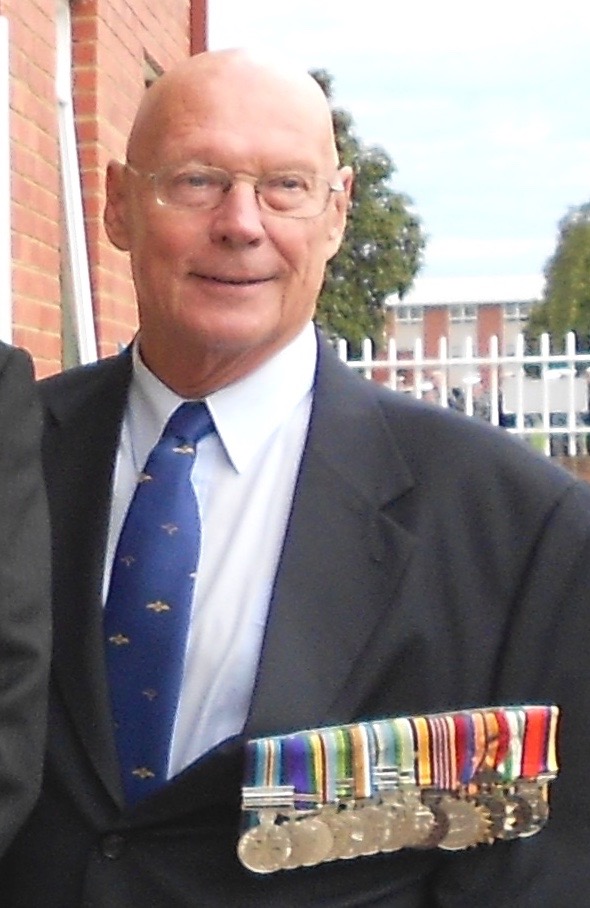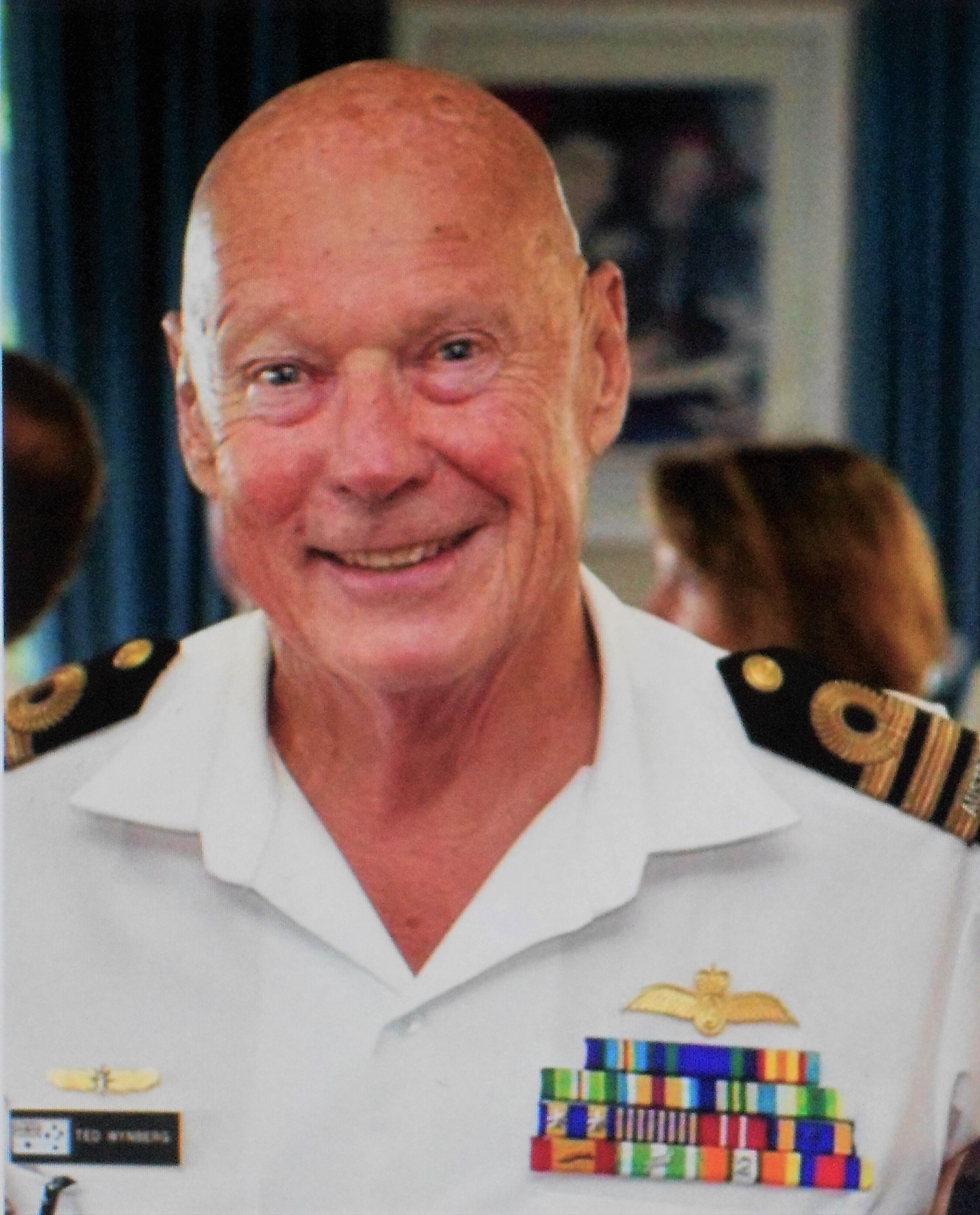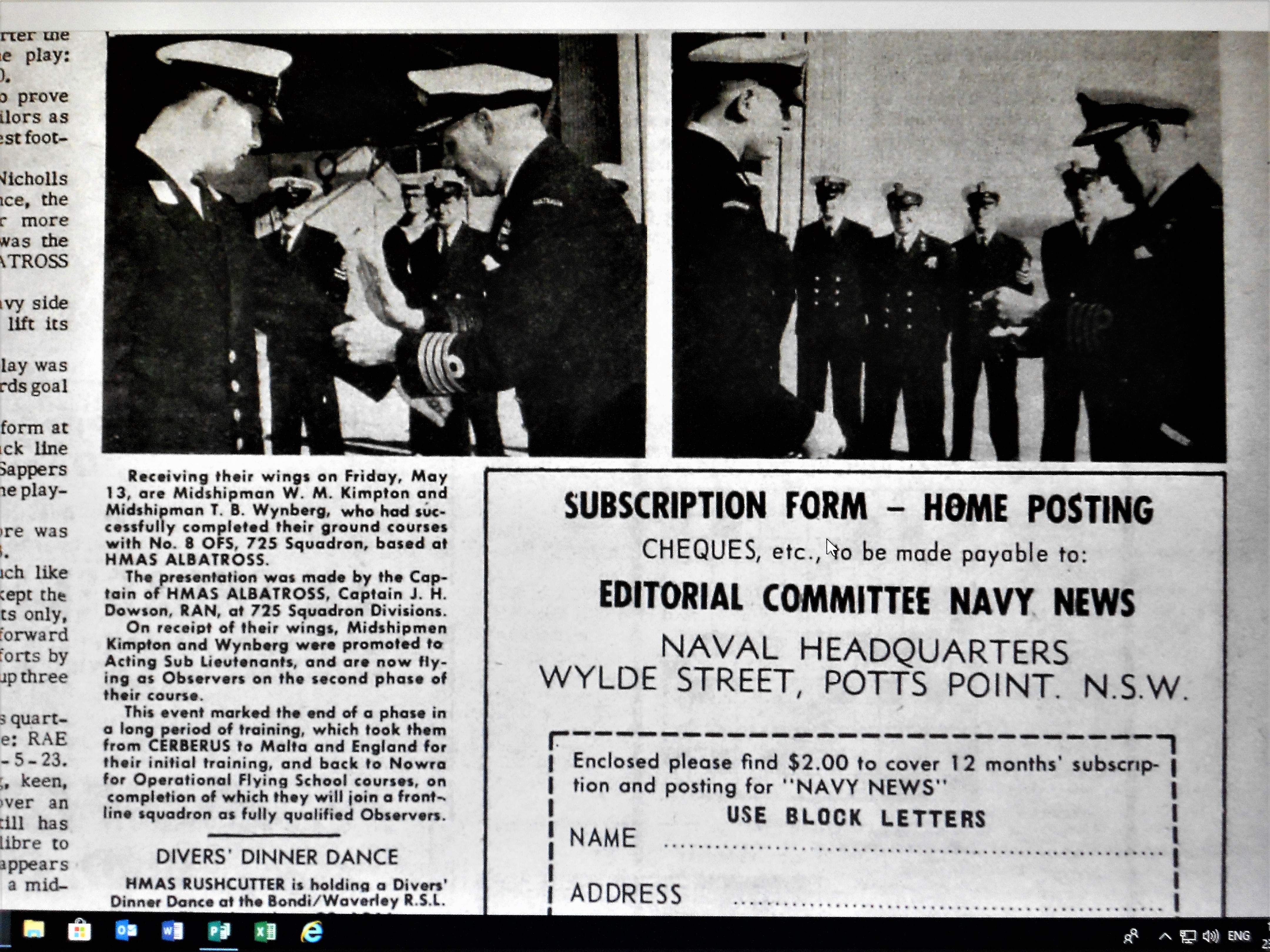 CMDR Ted Wynberg passed away unexpectedly on 25 June 2017, at his home in Sydney from a heart attack. He was a couple of weeks short of his 71st birthday.
CMDR Ted Wynberg passed away unexpectedly on 25 June 2017, at his home in Sydney from a heart attack. He was a couple of weeks short of his 71st birthday.
His funeral was held on Friday 7 June in Sydney, and was attended by some 400 mourners. It was – although it may seem incongruous to describe it this way – a magnificent affair. Held on a sunny afternoon under a sky of perfect blue, it acknowledged and embraced the pain of those who loved him most, and it honoured him by remembering all that he was and all that he did. If funerals there are to be, let them all be like this one!
The subsequent wake was in the combined officers/senior sailors mess at HMAS Penguin, the establishment Ted had commanded some years ago. As such things are, it was a rich gathering of family and friends and colleagues, and it provided time to remember and rejoice in this life, rather than grieve because it had been lost.
A brief synopsis of Ted’s career can be found in the shaded box below. Underneath that is one of the several eulogies presented by colleagues at his funeral. Each captured aspects of his life and time, but the one presented by Associate Professor Paul Davidson, a long time friend, seemed to embrace the essence of him. I hope it brings you memories of this remarkable individual.
Marcus Peake
Webmaster
THEODORE BERNARD WYNBERG
O 2356 COMMANDER
DOB: 04 JULY 1946
ENTRY TO RAN: 10 AUGUST 1964
CATEGORY: OBSERVER (MIDSHIPMAN)After completing Basic Aircrew Training Course at HMAS Cerberus he trained in the shore establishments HMAS Albatross and Watson as well as sea training in HMA Ships Sydney and Anzac until late April 1965. Midshipman Wynberg attended No. 81 RAN Observers Course with the RAF at Hal Far in Malta followed by further training with the Royal Navy in the UK between May 1965 and January 1966.
There followed training and operational flying in Wessex and Iroquois helicopters with 723, 725 and 817 Squadrons ashore and in HMAS Melbourne until September 1968, when he was posted to the RAN Helicopter Flight-Vietnam (RANHFV) Second Contingent. The contingent was integrated with the US Army 135th Assault Helicopter Company in South Vietnam flying Bell ‘Iroquois’ UH-1C Gunship and UH-1H Troop Carrier helicopters.
Upon return to Australia in May 1969, then Lieutenant Wynberg moved back to 723 Squadron and then 725 Squadron for operational flying duties in Wessex helicopters. He took up instructional duties at the RAAF School of Air Navigation in East Sale, Victoria between 1971 and 1974, followed by appointment as Senior Observer in 817 Squadron.
With promotion to Lieutenant Commander in 1976 came a two-year exchange posting to the US Naval Base in Pearl Harbor, Hawaii, and then return to RAAF East Sale as the Senior Naval Officer. Between 1980 and 1982 he was Air Operations Officer at HMAS Albatross. In March 1982 LCDR Wynberg was again overseas with the United Nations Multi-National Force and Observers in the Sinai overseeing peace-keeping agreements between Egypt and Israel.
Attendance at Staff College in 1985 preceded further administrative postings within Navy Headquarters and promotion to Commander in 1986. Commander Wynberg took over as Executive Officer of HMAS Nirimba, the RAN Apprentice Training Establishment at Quaker’s Hill, NSW between July 1991 and January 1994.
The position of Chief Staff Officer-Operations (Commander Air) at HMAS Albatross was taken up for 18 months and in June 1996 Commander Wynberg was appointed to the Directing Staff of the RAN Staff College at HMAS Penguin. He was appointed Commanding Officer and Director-Training Centre in August 1999 and he remained at Penguin until December 2001, having completed 37 years full-time service.
Throughout the ensuing fifteen and a half years Commander Wynberg continued to serve in a Reserves capacity performing a variety of administrative, ceremonial and representative roles, significant among which were duties as Honorary Aide de Camp to Governors-General and State Governors.
Commander Wynberg passed away suddenly at his home in Sydney on Sunday 25 June 2017.
Commander Ted Wynberg RAN – Eulogy
Published with the kind permission of Paul Davidson, Associate Professor School of Management, QUT
 I am honoured by the invitation to speak briefly about our friend, colleague and shipmate. I thank you for your presence here today, and I join with you in paying your respects to Ted.
I am honoured by the invitation to speak briefly about our friend, colleague and shipmate. I thank you for your presence here today, and I join with you in paying your respects to Ted.
DCN RADM Michael Noonan apologises for his absence overseas this week, otherwise he would have been here to grieve with us. His text read ‘I am so sorry to hear of the loss of our dear Ted, a huge man’. In so few words, DCN said it all. Ted was a huge man with a huge personality, who lived a huge life. He seemed to know everyone, and everyone knew him. A legend.
We both enlisted in the sixties, he in the Navy and me in the airforce – which Ted always regarded as a gross error of judgment on my part. He had a wonderful career as a naval officer, marked by adventure and service. I went off the rails and became a university professor.
I met Ted only 20 years ago, when we worked together, teaching at the Naval Staff College in HMAS PENGUIN.
We spent five very happy years at the Naval Staff College in Balmoral until it moved as a joint service college to Weston Creek in 2000.
Ted and I served under captains Mike Pike and Geoff Geraghty, and Dave Garnock, and with colleagues Tom Steward, and John Carter and Bruce Kafer, and Mick Cullen and Dave Richards (AFD, to distinguish him from the other Dave there at the time, who being a submariner became known as Dive Gladman; and Barsnacks Bramwell (you can ask Nick yourself how he got his name), and Peddles and Richard Jackson and Bruce McLellan, John Wells and Pete Lockwood, and Peter Murray and Janine Narbutas, and so many others – all great people, thoroughly professional, and a delight to work with. We all worked hard, had great times, and it was a great course. I remain in touch with many of the graduates.
Ted was a very good colleague with whom to teach: Self-disciplined more than most of us, and while extraverted and warm he was unyielding in his expectations of students, that they did their personal best, that they always behaved professionally and were a credit to the uniform they wore, no matter what their country that they were representing. When the course went anywhere, he was critical when anyone was late for the bus. Well, Ted, this bus you have taken came far too early.
Ted was meticulous in his attention to the detail of the work that students submitted for assessment, and he constantly encouraged our students to raise their performance. I shared his pride in those students who went on to illustrious careers after staff college. The DCN and Deputy Chief of Airforce, along with other star-ranked officers in the three services, are outstanding examples of Ted’s values and commitment. I acknowledge with the greatest respect, Ted’s work as a DS, and before that his service to our nation, in various combat zones, Vietnam and the Sinai in particular. I understand that as CO PENGUIN he was in a peacekeeping role, although CAPT Michael Hickey, then his loyal XO, and always his great friend, might think Ted started as many administrative brush fires as he extinguished. One thing was sure: he commanded with both purpose and humour, and always had the interests of the Navy at heart.
I was fortunate, as several of you also were, to travel a little with Ted. In 2002 we spent a week touring the battlefields of the Somme in France. It was Anzac day and we attended the ceremony at Villers Bretonneux. And Le Hamel. Ted kept introducing me to people as his father and said I had been in the battle there in 1917. I don’t know which one of those lies was worse. I regret that with his boyish cherubic smile, some of the locals there almost believed him.
It was very meaningful to stand with him in those same trenches where Australian soldiers had fought and died all those years ago. Ted had a deep respect for patriotism and sacrifice. We both grieved still the loss of lives on both sides, all those years ago.
However, Ted was more than a good naval officer. He was a good friend to so many of us, and his unexpected passing leaves us all conscious of the fragile and precious gift of life, even as we go through this dark night of grief. To his family, especially Josene and Andrew, and to dear Margot, I am sorry for your loss. It is ours also, and we share your grief.
Someone who captured in words the experience of grief was the English poet W.H. Auden, in words written decades ago, and made famous recently in the movie, ‘Four Weddings and a funeral.’
Stop all the clocks, cut off the telephone,
Prevent the dog from barking with a juicy bone,
Silence the pianos and with muffled drum
Bring out the coffin, let the mourners come.
Let aeroplanes circle moaning overhead
Scribbling on the sky the message He Is Dead,
Put crepe bows round the white necks of the public doves,
Let the traffic policemen wear black cotton gloves.
He was my North, my South, my East and West,
My working week and my Sunday rest,
My noon, my midnight, my talk, my song;
I thought that love would last for ever: I was wrong.
The stars are not wanted now: put out every one;
Pack up the moon and dismantle the sun;
Pour away the ocean and sweep up the wood.
For nothing now can ever come to any good.
I believe we all feel the same pessimistic sorrow as we ponder our loss. The same surge of injustice that Ted should be taken from us, leaving us in pain, and all the poorer.
Can I suggest that he made us first all the richer for knowing him. I differ from Auden, and I think that love can last forever, even when sustained only by memories. Like you, I loved Ted. He was a very special man.
Ted and I became good friends. He often stayed in my home in Brisbane when he came north to see his mother, and he would turn up with a bottle of wine. We would have an entertaining dinner, and half way through the wine he might say ‘not bad for $1.50’. He was not one to waste money, except on investments that were ‘sure things’. I used to stay in his apartment when I visited Sydney, where Ted insisted each cockroach has its own name. I fear that might not have been a joke. We spoke often by telephone. His greeting was always the same: ’ah, ‘FLTLT’ (he always teased me about my very minor role in the airforce many years ago) ‘How are you Ted?’ The answer was always the same ‘dynamic – a man who doesn’t drink or smoke is always dynamic’. I suspect he may have overstated his moderation just a little, for medicinal purposes. And he would add ‘every meal a feast and every day a holiday’. What’s not to like about such sunny optimism?
With his love of words, we had a running gag over decades that we were gruntled and shevelled, since these words seemed the logical opposites of being disgruntled and dishevelled. Thankfully we avoided questions about their meanings, or even their existence.
Ted always had the gift of making you see the funny side of just about any situation. Sometimes I felt my role was to be a bit player in some big funny story, yet to be told.
In Vietnam his Iroquois helicopter was hit by ground fire and crashed a few metres into a paddy field. Both he and the pilot suffered only minor injuries. Still taking ground fire, Ted turned to the pilot with the remark ‘Well done, that was one of your better landings’. Not many of us would have the wit to produce a line like that, in those circumstances.
Indeed, Ted’s sense of fun and humour were infectious. It was difficult to be sad around him.
But now we are sad because he has in his words ‘gone on ahead.’ I hope we all catch up with him again, eventually. For the moment, he has left us all with memories of a good man and a loyal friend to many.
He had a gift of being genuinely interested in everyone he talked to, whether it was a junior sailor or a visiting dignitary like the Governor General of New Zealand he had been sent to meet and greet at the airport, on behalf of the Australian government. They all felt they mattered more to him than anyone else, at least for the time he was with them. I am privileged that I seemed to matter to him. He certainly mattered to me, and I shall miss him greatly.
It’s become the custom to say at funerals ‘we shall not see his like again’. And we won’t.
Some will say ‘there was only one Ted Wynberg. Others might say ‘thank goodness there was only one Ted Wynberg’. I say thank goodness there was a Ted Wynberg’.
I used to tease him with an airforce salute. Today, I offer Ted a final naval salute. Ted, my dear friend, in our memories, you will always walk among giants.
Paul Davidson



